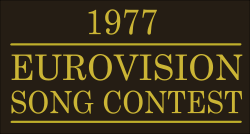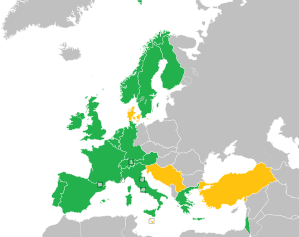Eurovision Song Contest 1977
| Eurovision Song Contest 1977 | |
|---|---|
 | |
| Dates | |
| Final | 7 May 1977 |
| Host | |
| Venue |
Wembley Conference Centre London, United Kingdom |
| Presenter(s) | Angela Rippon |
| Conductor | Ronnie Hazlehurst |
| Directed by | Stewart Morris |
| Executive supervisor | Clifford Brown |
| Host broadcaster | British Broadcasting Corporation (BBC) |
| Opening act | An aerial tour of the four constituent countries of the United Kingdom |
| Interval act | Mr. Acker Bilk and his Paramount Jazz Men |
| Participants | |
| Number of entries | 18 |
| Debuting countries | none |
| Returning countries | |
| Withdrawing countries | |
|
Participation map
| |
| Vote | |
| Voting system | Each country awarded 12, 10, 8-1 points to their 10 favourite songs |
| Nul points | None |
| Winning song |
"L'oiseau et l'enfant" |
The Eurovision Song Contest 1977 was the 22nd edition of the annual Eurovision Song Contest, and was held in London, United Kingdom on 7 May 1977. The presenter was Angela Rippon.
The contest was won by Marie Myriam, representing France, with the song "L'oiseau et l'enfant" (The Bird and the Child). This was France's fifth victory, a record at the time (since equalled by Luxembourg and the United Kingdom, and surpassed by Ireland and Sweden). It was also France's second victory on English soil, as well as its most recent victory to date.
Location
Located on the River Thames, London is the capital city of England and the United Kingdom, the largest metropolitan area in the United Kingdom, and the largest urban zone in the Europe by most measures. London has been a major settlement for two millennia, its history going back to its founding by the Romans, who named it Londinium.[1] Wembley Conference Centre, which opened in 1977, was the first purpose-built conference centre in the United Kingdom. The centre was chosen as host venue for the song contest, which was presented by Angela Rippon.
Format
The language rule was brought back in this contest, four years after it had been dropped in 1973. However Germany and Belgium were allowed to sing in English, because they had already chosen the songs they were going to perform before the rule was reintroduced.
As noted in The Eurovision Song Contest – The Official History by author and historian John Kennedy O'Connor, the contest was originally planned to be held on 2 April 1977, but because of a strike of BBC cameramen and technicians, it had to be postponed for a month. As a result, this was the first Eurovision Song Contest to be staged in May, which still continues today. [2]
Participating countries
At one point before the contest Tunisia was going to participate but it withdrew. Had Tunisia gone ahead they would have appeared fourth on stage.[2] Yugoslavia also withdrew, and did not return until 1981.
The Belgian act Dream Express had created some controversy in the press with reports that the three female members would wear transparent tops; this did not materialise for the actual event.[3]
The British conductor Ronnie Hazlehurst used an umbrella and wore a bowler hat during the UK entry.[4][5]
Conductors
Each performance had a conductor who maestro the orchestra.[6]













.svg.png)


.svg.png)

Returning artists
Several artists returned to the 1977 Contest. Beatrix Neundlinger and Günter Grosslercher from the group Schmetterlinge both represented Austria in 1972 as part of the band The Milestones. Patricia Maessen, Bianca Maessen, and Stella Maessen had previously represented the Netherlands in 1970 as part of the group Hearts of Soul, in 1977 they represented Belgium under the band name Dream Express.
Ireland's participant The Swarbriggs returned after their previous appearance back in 1975. Ilanit from Israel returned after previously representing the nation in 1973. Michèle Torr, Luxembourg's 1966 entrant participated for Monaco. And finally Fernando Tordo and Paulo de Carvalho (part of Os Amigos) returned once more after they previously represented the nation as solo acts back in 1973 and 1974 respectively.
Results
The following tables reflect the final official scores, verified after the contest transmission. During the voting sequence of the live show, several errors were made in the announcement of the scores, which were then adjusted after the broadcast. Both Greece and France duplicated scores, awarding the same points to multiple countries. From the Greek scores, The UK, Netherlands, Austria & Finland all had 1 point deducted after the contest and from the French scores, Austria, Germany, Israel, Italy & Portugal all had 1 point deducted. None of the adjustments affected the placing of any of the songs.
Notes:
- a. ^ Contains some words in English.
Scoreboard
| Results | ||||||||||||||||||||
|---|---|---|---|---|---|---|---|---|---|---|---|---|---|---|---|---|---|---|---|---|
| Ireland | 119 | 8 | 1 | 5 | 12 | 5 | 8 | 1 | 12 | 10 | 12 | 8 | 12 | 4 | 8 | 3 | 10 | |||
| Monaco | 96 | 5 | 8 | 1 | 6 | 1 | 6 | 7 | 12 | 2 | 6 | 10 | 8 | 12 | 5 | 2 | 5 | |||
| Netherlands | 35 | 3 | 3 | 1 | 1 | 1 | 7 | 1 | 10 | 8 | ||||||||||
| Austria | 11 | 5 | 2 | 3 | 1 | |||||||||||||||
| Norway | 18 | 3 | 2 | 2 | 1 | 5 | 5 | |||||||||||||
| Germany | 55 | 1 | 1 | 3 | 2 | 2 | 8 | 8 | 8 | 5 | 5 | 5 | 6 | 1 | ||||||
| Luxembourg | 17 | 2 | 7 | 8 | ||||||||||||||||
| Portugal | 18 | 2 | 2 | 1 | 4 | 3 | 6 | |||||||||||||
| United Kingdom | 121 | 12 | 7 | 12 | 7 | 10 | 12 | 12 | 8 | 8 | 3 | 2 | 4 | 12 | 12 | |||||
| Greece | 92 | 10 | 10 | 4 | 4 | 4 | 6 | 10 | 5 | 3 | 1 | 7 | 12 | 1 | 6 | 6 | 3 | |||
| Israel | 49 | 7 | 7 | 5 | 3 | 5 | 10 | 3 | 6 | 1 | 2 | |||||||||
| Switzerland | 71 | 6 | 10 | 10 | 5 | 4 | 4 | 6 | 4 | 4 | 10 | 8 | ||||||||
| Sweden | 2 | 2 | ||||||||||||||||||
| Spain | 52 | 6 | 1 | 7 | 7 | 3 | 4 | 3 | 7 | 7 | 7 | |||||||||
| Italy | 33 | 8 | 6 | 3 | 3 | 2 | 2 | 2 | 7 | |||||||||||
| Finland | 50 | 12 | 4 | 6 | 8 | 2 | 7 | 5 | 2 | 4 | ||||||||||
| Belgium | 69 | 4 | 12 | 6 | 8 | 4 | 7 | 10 | 5 | 6 | 4 | 3 | ||||||||
| France | 136 | 10 | 4 | 8 | 7 | 3 | 12 | 10 | 5 | 6 | 7 | 10 | 12 | 6 | 10 | 10 | 12 | 4 | ||
| The table is ordered by appearance | ||||||||||||||||||||
12 points
Below is a summary of all 12 points in the final:
| N. | Contestant | Voting nation |
|---|---|---|
| 6 | United Kingdom | Austria, Belgium, France, Luxembourg, Monaco, Portugal |
| 4 | Ireland | Israel, Norway, Sweden, United Kingdom |
| 3 | France | Finland, Germany, Switzerland |
| 2 | Monaco | Greece, Italy |
| 1 | Belgium | Netherlands |
| Finland | Ireland | |
| Greece | Spain |
International broadcasts and voting
The table below shows the order in which votes were cast during the 1977 contest along with the spokesperson who was responsible for announcing the votes for their respective country.
Voting and spokespersons













.svg.png)


.svg.png)

Each national broadcaster [with the exception of Israel] also sent a commentator to the contest, in order to provide coverage of the contest in their own native language.
References
- ↑ "Roman". The Museum of London. Archived from the original on March 22, 2008. Retrieved 7 June 2008.
- 1 2 O'Connor, John Kennedy (2007). The Eurovision Song Contest: The Official History. UK: Carlton Books. p. 68. ISBN 978-1-84442-994-3.
- ↑ O'Connor, John Kennedy (2007). The Eurovision Song Contest: The Official History. UK: Carlton Books. p. 71. ISBN 978-1-84442-994-3.
- ↑ Leigh, Spencer (4 October 2007). "Obituary – Ronnie Hazlehurst". The Daily Telegraph.
- ↑ "Obituary – Ronnie Hazlehurst". The Times. 3 October 2007.
- ↑ "Conductors 1977". 4Lyrics.com. Retrieved 20 October 2012.
- ↑ "Eurovision Song Contest 1977". The Diggiloo Thrush. Retrieved 4 March 2012.
- ↑ Dyrseth, Seppo (OGAE Norway)
- ↑ "Comentadores Do ESC – escportugalforum.pt.vu | o forum eurovisivo português". 21595.activeboard.com. Archived from the original on April 21, 2012. Retrieved 2012-08-10.
- ↑ "Εκφωνητές της ΕΡΤ για τις ψήφους της Ελλάδας στην EUROVISION – Page 3". Retromaniax.gr. Retrieved 2012-08-10.
- ↑ "פורום אירוויזיון". Sf.tapuz.co.il. 1999-09-13. Archived from the original on October 8, 2011. Retrieved 2012-08-10.
- ↑ Baumann, Peter Ramón (OGAE Switzerland)
- 1 2 3 "Infosajten.com". Infosajten.com. Archived from the original on July 18, 2012. Retrieved 2012-08-10.
- ↑ "Eurovisión 1977 – Jurado TVE". YouTube. 1977-05-07. Retrieved 2012-08-10.
- ↑ "Selostajat ja taustalaulajat läpi vuosien? • Viisukuppila". Viisukuppila.fi. Retrieved 2012-08-10.
- ↑ de Caunes, Georges et al. (May 7, 1977). 22ème Concours Eurovision de la Chanson 1977 [22nd Eurovision Song Contest 1977] (Television production). United Kingdom: BBC, TF1 (commentary).
- ↑ "Welkom op de site van Eurovision Artists". Eurovisionartists.nl. Retrieved 2012-08-10.
- ↑ Archived October 24, 2007, at the Wayback Machine.
- ↑ "Hvem kommenterte før Jostein Pedersen? - Debattforum". Nrk.no. Archived from the original on November 2, 2012. Retrieved 2012-08-10.
- ↑ "Eurovision Song Contest 1977". Ecgermany.de. Retrieved 2012-08-10.
- ↑ "Grand Final: 1977, 1977, Eurovision Song Contest". BBC.
- ↑ "Η Μακώ Γεωργιάδου και η EUROVISION (1970–1986)". Retromaniax.gr. Retrieved 2012-08-10.
- ↑ "FORO FESTIVAL DE EUROVISIÓN • Ver Tema – Uribarri comentarista Eurovision 2010". Eurosongcontest.phpbb3.es. Archived from the original on 2012-03-17. Retrieved 2012-08-10.
- ↑ "Selostajat ja taustalaulajat läpi vuosien? • Viisukuppila". Viisukuppila.fi. Retrieved 2012-08-10.
- ↑ Adriaens, Manu & Loeckx-Van Cauwenberge, Joken. Blijven kiken!. Lannoo, Belgium. 2003 ISBN 90-209-5274-9
- ↑ Christian Masson. "1977 – Wembley". Songcontest.free.fr. Retrieved 2013-05-26.
- ↑ Christian Masson. "1977 – Wembley". Songcontest.free.fr. Retrieved 2012-08-10.
- ↑ Háskólabókasafn, Landsbókasafn Íslands -. "Timarit.is". timarit.is.
- ↑ Háskólabókasafn, Landsbókasafn Íslands -. "Timarit.is". timarit.is.
External links
| Wikimedia Commons has media related to Eurovision Song Contest 1977. |

